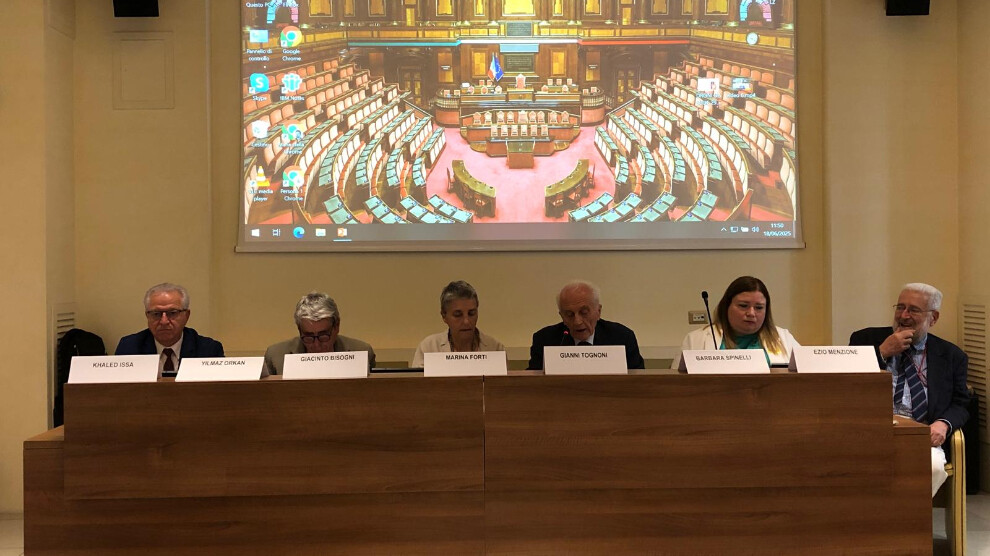The Future of Rojava discussed in the Italian Senate
The Permanent Peoples’ Tribunal held a press conference about the ruling it delivered at its February session on Rojava.
The Permanent Peoples’ Tribunal held a press conference about the ruling it delivered at its February session on Rojava.

The Permanent Peoples’ Tribunal presented the decisions taken during its 54th session held in Brussels in February, where it discussed war crimes committed in Rojava. The press conference was held at the Santa Maria Institute in the Senate building in Rome. Attending were legal experts from Italy who participated in the tribunal, Xalid Issa, representing the Autonomous Administration of Northern and Eastern Syria, and Yılmaz Orkan, representative of UIKI (Italian Kurdistan Office) Onlus.
The Permanent Peoples’ Tribunal convened on February 5–6 this year in Brussels to hear testimonies regarding war crimes committed in Rojava since 2018. Today's press conference, titled "Rojava as an Example for the Future of Syria", took place in the Italian Senate and included tribunal judges such as Giacinto Bisogni and Domenico Gallo, both of whom have served as former presidents of divisions of the Supreme Court. Gianni Tognoni, Secretary General of the Tribunal since 1979, Enzio Menzione, a trial lawyer and international observer representing the Italian Union of Criminal Chambers, and Barbara Spinelli, co-chair of the European Association of Lawyers for Democracy and Human Rights (ELDH), also attended the press conference.
The court reviewed instances of injustice based on concrete events, evidence, and testimonies. The tribunal emphasized that the right to speak is safeguarded in this region, where international judicial mechanisms often fail to function. Judges and lawyers involved in the tribunal gave brief presentations on the key stages of the hearing. It was noted that the testimonies and documents presented contributed to identifying the Turkish state's responsibility in human rights violations against civilians.
The press conference highlighted that the autonomy project in Rojava, currently in a sensitive phase of democratic transition, could serve as a model in shaping the future of Syria.
Gianni Tognoni, the tribunal’s secretary general, noted that Rojava has achieved significant experience in gender equality, democracy, and self-governance, and that the model has been sustained in practice despite all obstacles.
Judge Giacinto Bisogni stated that, despite the Turkish state’s claims of “fighting terrorism,” their attacks targeted schools, hospitals, and infrastructure, ultimately affecting civilians.
Lawyer Barbara Spinelli emphasized that these attacks created a climate of fear for every civilian working within the autonomous administration. Lawyer Ezio Menzione, after sharing his impressions of the tribunal, said: “Despite all the challenges, Rojava is giving everyone a lesson in democracy, both culturally and socially.”
Xalid Issa, the representative of the Autonomous Administration of Northern and Eastern Syria, remarked: “In the past, we made efforts to protect our land and our system; now we are putting that same effort into living together.”
Yılmaz Orkan, representing UIKI, said that the PKK's transformation process has brought its own set of challenges. He added: “Due to the Turkish state’s past policies, society suffers from a lack of trust. However, Leader Öcalan insists on a policy of peace.”